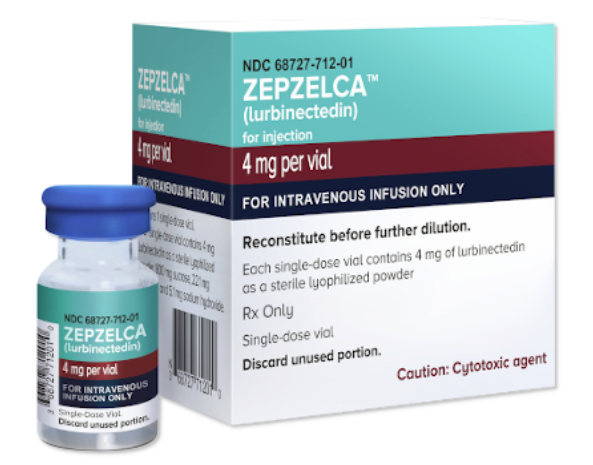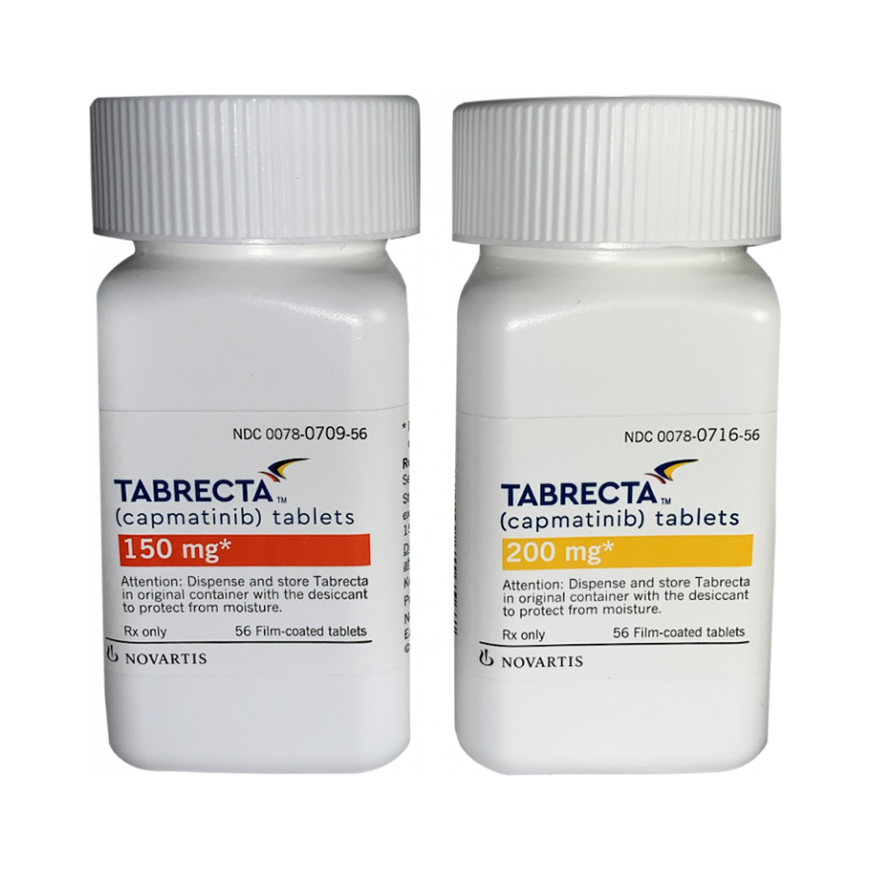Zepzelca (lurbinectedin) vs Tabrecta (capmatinib)
Zepzelca (lurbinectedin) vs Tabrecta (capmatinib)
Zepzelca (lurbinectedin) is a medication used for the treatment of adults with metastatic small cell lung cancer (SCLC) that has progressed after platinum-based chemotherapy. It works by binding to DNA and inhibiting the transcription process, which is essential for cancer cell growth. On the other hand, Tabrecta (capmatinib) is specifically indicated for the treatment of adults with non-small cell lung cancer (NSCLC) that has a mutation leading to MET exon 14 skipping, and it functions by targeting and inhibiting the MET receptor tyrosine kinase, which is involved in the growth and spread of cancer cells. The choice between Zepzelca and Tabrecta would depend on the specific type of lung cancer a patient has, as well as the presence of certain genetic mutations, and should be made in consultation with an oncologist who can evaluate the patient's individual condition and treatment history.
Difference between Zepzelca and Tabrecta
| Metric | Zepzelca (lurbinectedin) | Tabrecta (capmatinib) |
|---|---|---|
| Generic name | Lurbinectedin | Capmatinib |
| Indications | Metastatic Small Cell Lung Cancer (SCLC) | Metastatic Non-Small Cell Lung Cancer (NSCLC) with MET exon 14 skipping mutations |
| Mechanism of action | Inhibits transcription and induces DNA breaks | Receptor tyrosine kinase inhibitor |
| Brand names | Zepzelca | Tabrecta |
| Administrative route | Intravenous | Oral |
| Side effects | Fatigue, nausea, decreased appetite, constipation, and other hematologic abnormalities | Nausea, vomiting, fatigue, edema, dyspnea, and other hematologic abnormalities |
| Contraindications | Hypersensitivity to lurbinectedin or excipients | Hypersensitivity to capmatinib or any of its excipients |
| Drug class | Alkylating drug | Kinase inhibitor |
| Manufacturer | Pharma Mar | Novartis |
Efficacy
Zepzelca (Lurbinectedin) for Small Cell Lung Cancer
Zepzelca (lurbinectedin) is a medication specifically approved for the treatment of adults with metastatic small cell lung cancer (SCLC) that has progressed after prior platinum-containing therapy. As an alkylating drug, lurbinectedin works by binding to the DNA in cancer cells, which ultimately disrupts their ability to grow and divide. The efficacy of Zepzelca in treating SCLC was primarily demonstrated in a multi-center, single-arm, open-label clinical study. The study's results showed a significant effect on tumor shrinkage, with a considerable percentage of patients experiencing a reduction in tumor size. This has provided a new option for patients with SCLC who have limited treatment choices after first-line therapy.
Tabrecta (Capmatinib) for Non-Small Cell Lung Cancer
Tabrecta (capmatinib) is a kinase inhibitor indicated for the treatment of adult patients with metastatic non-small cell lung cancer (NSCLC) whose tumors have a mutation that leads to mesenchymal-epithelial transition (MET) exon 14 skipping. This mutation can be identified through an FDA-approved test, which is used to determine patient eligibility for treatment with Tabrecta. The efficacy of Tabrecta was evaluated in a multicohort, multicenter, non-randomized, open-label study, which included patients with NSCLC harboring MET exon 14 skipping mutations. The results of the study showed a notable response rate, indicating that the drug can lead to tumor shrinkage in a significant proportion of patients.
Comparative Efficacy in Lung Cancer Treatment
While Zepzelca and Tabrecta are both used in the treatment of different forms of lung cancer, their efficacy is specific to the type of lung cancer and the genetic characteristics of the tumor. Zepzelca is used for SCLC after the failure of initial therapy, whereas Tabrecta is specifically for NSCLC with a particular genetic mutation. It is important for healthcare professionals to distinguish between these indications and select the appropriate treatment based on the patient's specific type of lung cancer and genetic profile.
Conclusion on Lung Cancer Treatment with Zepzelca and Tabrecta
In conclusion, both Zepzelca and Tabrecta have shown efficacy in treating specific subtypes of lung cancer, providing new hope for patients with advanced disease. Zepzelca offers a treatment option for SCLC patients who have relapsed, while Tabrecta targets a subset of NSCLC patients with MET exon 14 skipping mutations. These targeted therapies are part of the evolving landscape of precision medicine in oncology, which aims to tailor treatments to the unique genetic makeup of an individual's cancer, potentially improving outcomes and reducing the burden of disease.
Regulatory Agency Approvals
Zepzelca
-
Food and Drug Administration (FDA), USA

Tabrecta
-
European Medical Agency (EMA), European Union

-
Food and Drug Administration (FDA), USA

-
Pharmaceuticals and Medical Devices Agency (PMDA), Japan

Access Zepzelca or Tabrecta today
If Zepzelca or Tabrecta are not approved or available in your country (e.g. due to supply issues), you can access them via Everyone.org.
How it works

Make an enquiry
Choose the medicine you want to buy, answer a couple of questions, and upload your prescription to speed things up. We’ll get back to you within 24 hours.


Make an enquiry
Choose the medicine you want to buy, answer a couple of questions, and upload your prescription to speed things up. We’ll get back to you within 24 hours.


Breeze through the paperwork
We'll guide you through the required documents for importing unapproved medicine, ensuring you have all the necessary information.


Get a personalized quote
We’ll prepare a quote for you, including medicine costs and any shipping, administrative, or import fees that may apply.


Receive your medicine
Accept the quote and we’ll handle the rest - sourcing and safely delivering your medicine.

Some text on this page has been automatically generated. Speak to your physician before you start a new treatment or medication.
Let's talk
If you have any questions, call us or send us a message through WhatsApp or email:
Contact us




